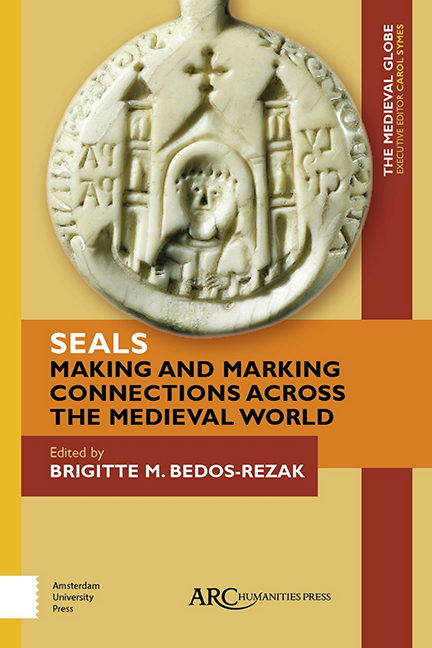Book contents
- Frontmatter
- Contents
- List of Illustrations
- Acknowledgements
- Cultural Transactions: An Introduction to Medieval Seals from a Global Perspective
- Seals as Conceptual and Ritual Tools in Chinese Buddhism, ca. 600– 1000 CE
- Imprinting Powers: The Astrological Seal and Its Doctrinal Meanings in the Latin West
- A Medieval Solution to an Early Modern Problem? The Royal Animal Seals of Jambi
- Expressing New Rule: Seals from Early Islamic Egypt and Syria, 600– 800 CE
- The Formulation of Urban Identity on Byzantine Seals
- The Cloth Seal: A Mark of Quality, Identification, or Taxation?
- Archaeology and Sigillography in Northern Europe
- Medieval Treaties and the Diplomatic Aesthetic
- Index
Medieval Treaties and the Diplomatic Aesthetic
Published online by Cambridge University Press: 20 November 2020
- Frontmatter
- Contents
- List of Illustrations
- Acknowledgements
- Cultural Transactions: An Introduction to Medieval Seals from a Global Perspective
- Seals as Conceptual and Ritual Tools in Chinese Buddhism, ca. 600– 1000 CE
- Imprinting Powers: The Astrological Seal and Its Doctrinal Meanings in the Latin West
- A Medieval Solution to an Early Modern Problem? The Royal Animal Seals of Jambi
- Expressing New Rule: Seals from Early Islamic Egypt and Syria, 600– 800 CE
- The Formulation of Urban Identity on Byzantine Seals
- The Cloth Seal: A Mark of Quality, Identification, or Taxation?
- Archaeology and Sigillography in Northern Europe
- Medieval Treaties and the Diplomatic Aesthetic
- Index
Summary
THIS ESSAY BRINGS two strands of scholarship into conversation with one another: the New Diplomatic History and the study of material texts as visual culture. What follows is an examination of a significant point of contact for these two discussions: the documents of diplomacy and, more specifically, treaty ratifications in late medieval Europe. A central premise of New Diplomatic History is that it involves an understanding of diplomacy as an expanded field— in other words, there is more to diplomacy than treaties. As this analysis will suggest, there is also more to treaties themselves. Letters of procuration, articles of agreement, and treaty ratifications all have allusive and symbolic elements, and even these most canonical sources of diplomatic history belong also to cultural history. The first part of this essay will explain some of the motivations for my choice of method and sources; the second part will offer some specific illustrative examples of that method in practice. There are important precedents for discussing both diplomacy and diplomatics in structural terms, without reference to (even widely variant) political content, and the analysis in these examples draws from and seeks to expand on them.
Diplomacy and Textual Objects
This approach returns with new eyes to some of the most traditional subject matter of “Old” diplomatic history, by bringing some of the conceptual framework that inspires the expanded field of diplomacy back to the centre of that field, and by integrating that framework with the analytic practices of art history, visual culture studies, and the study of material texts. In doing so, this analysis also draws from long-standing practices of the so-called auxiliary sciences of diplomatics and palaeography, as well as some of the intellectual innovations of their recent practitioners. Scholars of diplomatics have always devoted attention to the material aspects of their documents, while palaeographical literature, by definition, concerns itself with the visual culture of letter forms, developing a specific vocabulary for their description; in both cases, the conceptual and theoretical implications of these methods are increasingly explicitly voiced.
The analysis of medieval treaty documents contributes to the themes of The Medieval Globe's special issue on a straightforwardly practical as well as a more conceptual level. Ratifications constitute clear instances of exchanged impressions in the most literal sense: through these documents, which formally conclude diplomatic negotiations, two chanceries exchange impressions of their seals of central government.
- Type
- Chapter
- Information
- Seals - Making and Marking Connections across the Medieval World , pp. 213 - 238Publisher: Amsterdam University PressPrint publication year: 2019



